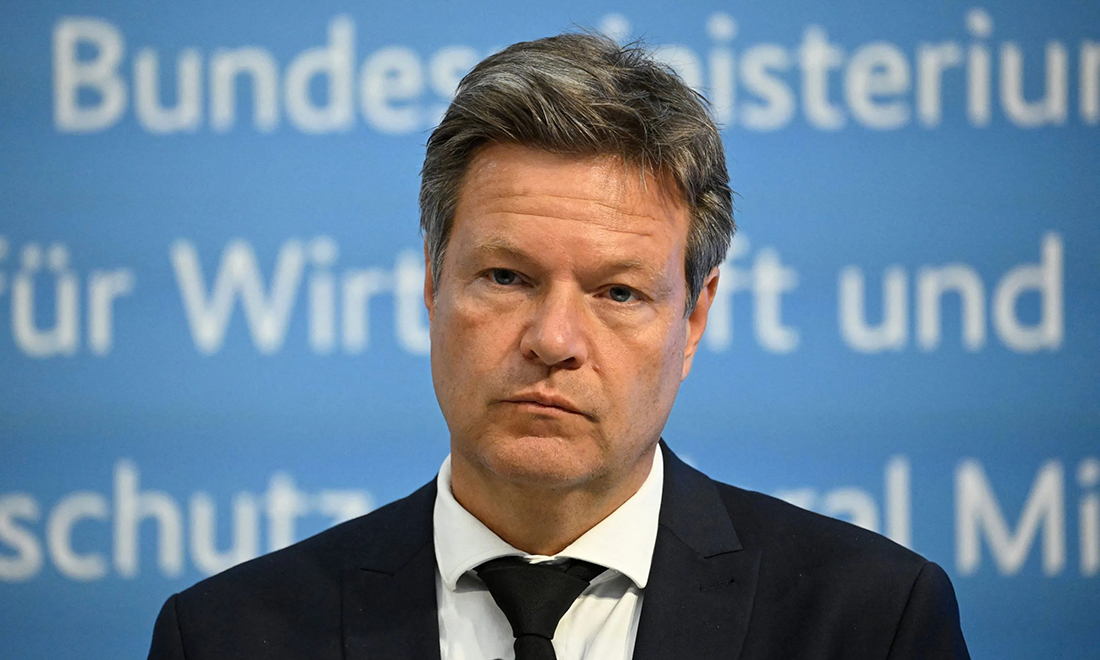
随着来自俄罗斯的天然气供应中断,德国距离实行天然气定量供应的政策更近了一步。德国经济事务主管官员警告称,俄罗斯天然气断供可能导致更大规模的经济溢出效应。
德国经济和气候保护部的部长罗伯特·哈贝克表示,截至6月23日,德国已经进入天然气供应应急计划中的“第二阶段警戒水平”。
6月14日,连接俄罗斯与德国的北溪1号(Nord Stream 1)管道开始停止供气之后,德国经济和气候保护部宣布,在第二阶段,“目前供应安全有保障,但形势严峻。”
哈贝克在政府公告所附的一份声明中说:“尽管我们还没有感觉,但我们已经处在一场天然气危机当中。目前,天然气是一种稀缺资产。”
哈贝克还指出,供气量持续下降和价格持续上涨所产生的连锁反应,将对能源市场造成无法挽救的、影响深远的伤害,类似于“雷曼兄弟效应”。2008年,雷曼兄弟(Lehman Brother)投资银行宣布破产,由此产生的经济冲击波及全球金融体系。
哈贝克称:“整个市场面临在某个时间点崩溃的风险。”
由于德国严重依赖俄罗斯天然气进口,随着俄乌冲突爆发,俄罗斯倾向于用能源出口作为武器,导致德国市场受到最严重的冲击。2021年,俄罗斯天然气占德国天然气进口量的55%,2022年第一季度占比为40%。
从今年年初到5月底,德国成功将俄罗斯进口天然气占比降低至35%,但面对俄罗斯供应即使最轻微的变化,德国的能源市场依旧高度脆弱。
上周,俄罗斯开始削减对德天然气出口。俄罗斯天然气工业股份公司(Gazprom)表示,减少供应的原因是技术问题导致北溪管道俄罗斯段的一座发电厂天然气压缩机停止运行。此事的影响迅速显现,欧洲天然气价格暴涨24%,而哈柏克当时回应称俄罗斯此举有“政治动机”。
哈贝克在最近的声明中表示不确定俄罗斯总统弗拉基米尔·普京未来是否会继续采取相同的措施,并呼吁德国做好准备。
哈贝克说:“价格已经高居不下,我们需要为未来价格继续上涨做好准备。这会影响我们的工业产值,大幅增加许多消费者的负担。这是一次外部冲击。”
哈贝克还指出,德国的“首要任务”是在今年入冬之前补充天然气库存,但他承认,俄罗斯的威胁使德国的能源安全前景变得不可预测,更严格的能源定量供应措施可能不可避免。
他说:“无论工业、公共部门还是家庭消费者,都应该尽量继续减少天然气消耗,让我们能够顺利过冬。”
德国经济和气候保护部的声明指出,虽然其鼓励采取定量供应,但德国进入第二阶段“警戒”水平意味着,德国天然气公司和供应商现在面临更大压力,需要在未来几个月内找到替代天然气来源,以维持库存水平稳定。德国政府将向天然气公司发放158亿美元贷款和信用,用于从海外采购更多天然气,并维持天然气供应。
据路透社(Reuters)报道,在第二阶段警戒水平,公司理论上可以将更高的成本转嫁给消费者,但政府目前尚不允许这种情况发生。
德国经济和气候保护部的声明表示,如果德国进入第三阶段警戒水平,政府就能够开始单方面决定是否以及在哪些地区实行天然气定量供应政策。(财富中文网)
译者:刘进龙
审校:汪皓
随着来自俄罗斯的天然气供应中断,德国距离实行天然气定量供应的政策更近了一步。德国经济事务主管官员警告称,俄罗斯天然气断供可能导致更大规模的经济溢出效应。
德国经济和气候保护部的部长罗伯特·哈贝克表示,截至6月23日,德国已经进入天然气供应应急计划中的“第二阶段警戒水平”。
6月14日,连接俄罗斯与德国的北溪1号(Nord Stream 1)管道开始停止供气之后,德国经济和气候保护部宣布,在第二阶段,“目前供应安全有保障,但形势严峻。”
哈贝克在政府公告所附的一份声明中说:“尽管我们还没有感觉,但我们已经处在一场天然气危机当中。目前,天然气是一种稀缺资产。”
哈贝克还指出,供气量持续下降和价格持续上涨所产生的连锁反应,将对能源市场造成无法挽救的、影响深远的伤害,类似于“雷曼兄弟效应”。2008年,雷曼兄弟(Lehman Brother)投资银行宣布破产,由此产生的经济冲击波及全球金融体系。
哈贝克称:“整个市场面临在某个时间点崩溃的风险。”
由于德国严重依赖俄罗斯天然气进口,随着俄乌冲突爆发,俄罗斯倾向于用能源出口作为武器,导致德国市场受到最严重的冲击。2021年,俄罗斯天然气占德国天然气进口量的55%,2022年第一季度占比为40%。
从今年年初到5月底,德国成功将俄罗斯进口天然气占比降低至35%,但面对俄罗斯供应即使最轻微的变化,德国的能源市场依旧高度脆弱。
上周,俄罗斯开始削减对德天然气出口。俄罗斯天然气工业股份公司(Gazprom)表示,减少供应的原因是技术问题导致北溪管道俄罗斯段的一座发电厂天然气压缩机停止运行。此事的影响迅速显现,欧洲天然气价格暴涨24%,而哈柏克当时回应称俄罗斯此举有“政治动机”。
哈贝克在最近的声明中表示不确定俄罗斯总统弗拉基米尔·普京未来是否会继续采取相同的措施,并呼吁德国做好准备。
哈贝克说:“价格已经高居不下,我们需要为未来价格继续上涨做好准备。这会影响我们的工业产值,大幅增加许多消费者的负担。这是一次外部冲击。”
哈贝克还指出,德国的“首要任务”是在今年入冬之前补充天然气库存,但他承认,俄罗斯的威胁使德国的能源安全前景变得不可预测,更严格的能源定量供应措施可能不可避免。
他说:“无论工业、公共部门还是家庭消费者,都应该尽量继续减少天然气消耗,让我们能够顺利过冬。”
德国经济和气候保护部的声明指出,虽然其鼓励采取定量供应,但德国进入第二阶段“警戒”水平意味着,德国天然气公司和供应商现在面临更大压力,需要在未来几个月内找到替代天然气来源,以维持库存水平稳定。德国政府将向天然气公司发放158亿美元贷款和信用,用于从海外采购更多天然气,并维持天然气供应。
据路透社(Reuters)报道,在第二阶段警戒水平,公司理论上可以将更高的成本转嫁给消费者,但政府目前尚不允许这种情况发生。
德国经济和气候保护部的声明表示,如果德国进入第三阶段警戒水平,政府就能够开始单方面决定是否以及在哪些地区实行天然气定量供应政策。(财富中文网)
译者:刘进龙
审校:汪皓
Germany is one step closer to having to ration its gas usage as supply from Russia starts to dry up, and the country’s top economic affairs official is warning that it could lead to an even larger economic spillover effect.
As of June 23, Germany has entered the second alert level of its emergency gas plan, according to Robert Habeck, Germany’s minister for economic affairs and climate action.
At this level, “security of supply is currently ensured, but the situation is tense,” Habeck’s ministry announced, after gas supplies along the Nord Stream 1 pipeline connecting Russia to Germany began drying up on June 14.
“Even if we don’t feel it yet, we are in the midst of a gas crisis. From now on, gas is a scarce asset,” Habeck said in a statement accompanying the ministry’s announcement.
Habeck added that if supply continues to fall, and prices continue to rise, it could create ripples that would do irreparable and wide-reaching damage to the energy market, in what he likened to a “Lehman Brothers effect,” referring to when the Lehman Brothers investment bank declared bankruptcy in 2008, sending economic shock waves through the global financial system.
“The whole market is in danger of collapsing at some point,” Habeck said.
German markets have been among the hardest hit by the war in Ukraine and Russia’s willingness to use energy exports as a weapon owing to the country’s heavy reliance on Russian gas imports. Russia accounted for 55% of Germany’s gas imports in 2021, and 40% in the first quarter of 2022.
Between the beginning of the year and the end of May, Germany has been able to lower Russian gas imports to 35%, but the country’s energy markets are still highly vulnerable to even the slightest changes in supply from Russia.
When Russia began tightening gas flows to Germany last week, Russian gas company Gazprom said it was because of technical issues involving a missing gas compressor unit at a power plant on the Russian side of the Nord Stream pipeline. The shutoff had an immediate effect, sending gas prices surging 24% across Europe, and Habeck responded to the act at the time by calling it “politically motivated.”
In his most recent statements, Habeck expressed uncertainty that Russian President Vladimir Putin would not resort to the same measures again in future, and he urged Germans to prepare.
“Prices are already high, and we need to brace ourselves for further increases. This will impact our industrial output and impose a great burden on many consumers. It is an external shock,” Habeck said.
Habeck added that it is the country’s “top priority” to fill up gas storage ahead of next winter, but acknowledged that the threat from Russia makes Germany’s energy security outlook less predictable, and that more stringent energy rationing measures may be inevitable.
“All consumers—in industry, in public institutions, and in households—should continue to cut their gas consumption as far as they can so that we can get through the winter,” he said.
While encouraging rationing measures, moving to its second alert level means that German gas companies and suppliers are now under more pressure to find alternative sources of gas to help keep storage levels stable within the next few months, according to the ministry’s statement. The German government is providing gas companies $15.8 billion in loans and credit to purchase more gas from abroad and help shore up supplies.
At the second alert level, companies could theoretically begin passing on the higher costs to consumers, but the government is not allowing that to happen yet, Reuters reported.
Should Germany enter its third alert level, the government would be able to begin unilaterally deciding when and where to ration gas supplies, according to the ministry’s statement.






